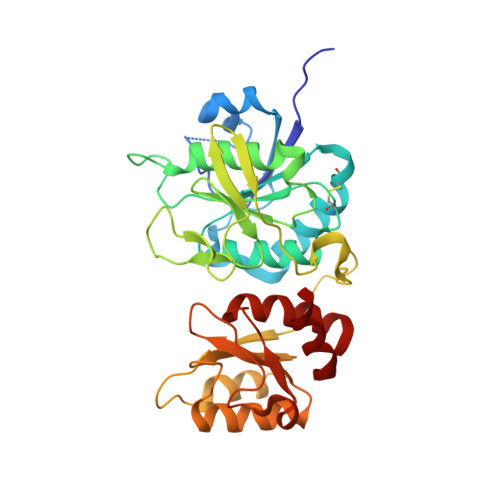Mechanism of Catalysis by l-Asparaginase.
Lubkowski, J., Vanegas, J., Chan, W.K., Lorenzi, P.L., Weinstein, J.N., Sukharev, S., Fushman, D., Rempe, S., Anishkin, A., Wlodawer, A.(2020) Biochemistry 59: 1927-1945
- PubMed: 32364696
- DOI: https://doi.org/10.1021/acs.biochem.0c00116
- Primary Citation of Related Structures:
6V23, 6V24, 6V25, 6V26, 6V27, 6V28, 6V29, 6V2A, 6V2B, 6V2C, 6V2G - PubMed Abstract:
Two bacterial type II l-asparaginases, from Escherichia coli and Dickeya chrysanthemi , have played a critical role for more than 40 years as therapeutic agents against juvenile leukemias and lymphomas. Despite a long history of successful pharmacological applications and the apparent simplicity of the catalytic reaction, controversies still exist regarding major steps of the mechanism. In this report, we provide a detailed description of the reaction catalyzed by E. coli type II l-asparaginase (EcAII). Our model was developed on the basis of new structural and biochemical experiments combined with previously published data. The proposed mechanism is supported by quantum chemistry calculations based on density functional theory. We provide strong evidence that EcAII catalyzes the reaction according to the double-displacement (ping-pong) mechanism, with formation of a covalent intermediate. Several steps of catalysis by EcAII are unique when compared to reactions catalyzed by other known hydrolytic enzymes. Here, the reaction is initiated by a weak nucleophile, threonine, without direct assistance of a general base, although a distant general base is identified. Furthermore, tetrahedral intermediates formed during the catalytic process are stabilized by a never previously described motif. Although the scheme of the catalytic mechanism was developed only on the basis of data obtained from EcAII and its variants, this novel mechanism of enzymatic hydrolysis could potentially apply to most (and possibly all) l-asparaginases.
Organizational Affiliation:
Macromolecular Crystallography Laboratory, Center for Cancer Research, National Cancer Institute, Frederick, Maryland 21702, United States.













